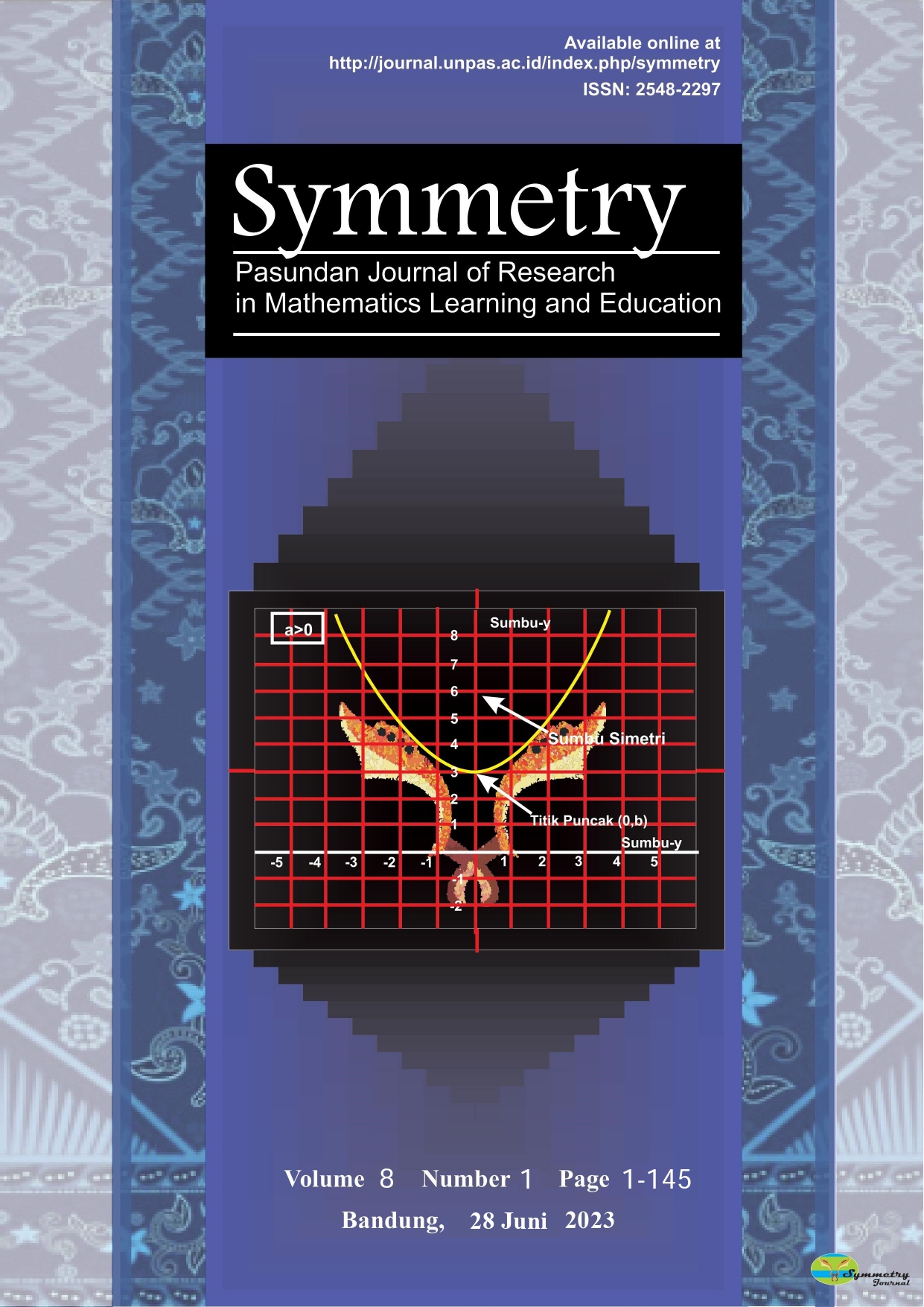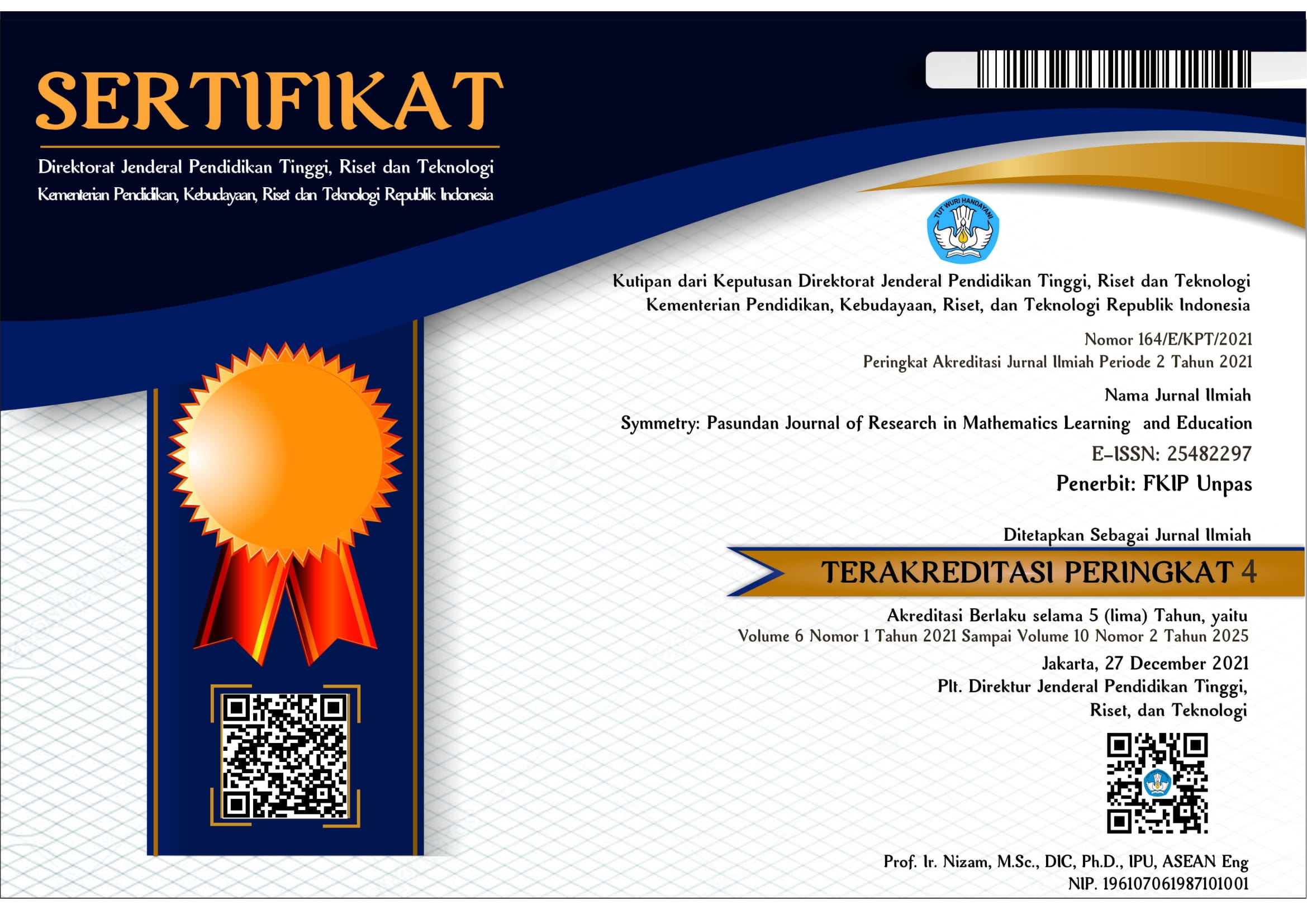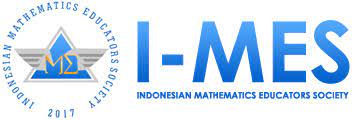SYSTEMATIC LITERATURE REVIEW: PEMBELAJARAN MATEMATIKA BERBASIS E-LEARNING UNTUK MENINGKATKAN LITERASI MATEMATIS SISWA INDONESIA
DOI:
https://doi.org/10.23969/symmetry.v8i2.10552Keywords:
literasi matematis, matematika, e-learning, SLRAbstract
This study aims to describe the results of research on e-learning based mathematics learning to improve students' mathematical literacy in Indonesia. The method used in this study is a systematic literature review (SLR) by searching for articles using the Harzing's Publish or Perish application from Google Scholar and Scopus databases. The articles consists of 20 national and international articles indexed by SINTA and Scopus which were published in 2020-2023. The results of the study show that research related to e-learning-based mathematics learning to improve mathematical literacy has received quite good attention in recent years, indicated by research trends that continue to increase in the period 2020-2023. The majority of research was conducted at the junior high school level with the most used materials were trigonometry, statistics and quadrilaterals. The literature study was dominated by Java and Bali using quantitative research methods. Most of the research used the blended learning model and Google Classroom e-learning media, and e-learning based mathematics learning can be used effectively to increase students' mathematical literacy in Indonesia.
Downloads
References
Al Rawashdeh, A. Z., Mohammed, E. Y., Al Arab, A. R., Alara, M., & Al Rawashdeh, B. (2021). Advantages and Disadvantages of Using e-Learning in University Education : Analyzing Students ’ Perspectives. The Electronic Journal of E-Learning, 19(3), 107–117.
Alifia, Z., & Pradipta, T. R. (2021). Analisis Motivasi Belajar Matematika Siswa dalam Penerapan Edmodo di Masa Pandemi COVID-19. Jurnal Cendekia : Jurnal Pendidikan Matematika, 5(2), 1062–1070. https://doi.org/10.31004/cendekia.v5i2.591
Angreanisita, W., Mastur, Z., & Rochmad, R. (2021). Mathematical Literacy Seen from Learning Independency in Blended Learning with Project Based Learning Assisted by Moodle. Unnes Journal of Mathematics Education Research, 10(2), 155–161.
Aritonang, I., & Safitri, I. (2021). Pengaruh Blended Learning Terhadap Peningkatan Literasi Matematika Siswa. Jurnal Cendekia: Jurnal Pendidikan Matematika, 5(1), 735–743. https://doi.org/10.31004/cendekia.v5i1.555
Asmara, A. S., Waluya, S. ., & Rochmad, R. (2017). Analisis Kemampuan Literasi Matematika Siswa Kelas X Berdasarkan Kemampuan Matematika. Scholaria, 7(02), 135–142.
Atho’illah, I., Kartono, K., & Masrukan, M. (2022). Literasi Matematika Berdasarkan Self Efficacy dengan Model Flipped Classroom Menggunakan Asesmen Dinamis. PRISMA, 11(1), 42–52. https://doi.org/10.35194/jp.v11i1.2153
Basilaia, G., & Kvavadze, D. (2020). Transition to Online Education in Schools during a SARS-CoV-2 Coronavirus (COVID-19) Pandemic in Georgia. Pedagogical Research, 5(4). https://doi.org/10.29333/pr/7937
Batmetan, J. R., Katuuk, D. A., Lengkong, J. S. J., & Rotty, V. N. J. (2023). An Investigation of E-Learning Readiness in Vocational High School During the Post Pandemic Covid-19: Case from North Sulawesi. International Journal of Information Technology and Education, 2(3), 77–92.
Dewi, A. R., & Widjajanti, D. B. (2022). Effectiveness of scientific approach based on multiple intelligences theory in terms of student’s mathematical literacy skill and self-confidence that implemented online. In AIP Conference Proceedings (Vol. 2575). AIP Publishing. https://doi.org/10.1063/5.0111079
Fauzi, I., & Chano, J. (2022). Online Learning: How Does It Impact on Students’ Mathematical Literacy in Elementary School? Journal of Education and Learning, 11(4), 220. https://doi.org/10.5539/jel.v11n4p220
Hendroanto, A., Istiandaru, A., Syakrina, N., Setyawan, F., Charitas, R., Prahmana, I., & Hidayat, A. S. E. (2018). How Students Solves PISA Tasks: An Overview of Students’ Mathematical Literacy. International Journal on Emerging Mathematics Education, 2(2), 129–138. https://doi.org/10.12928/ijeme.v2i2.10713
Hutagaol, A. S. R., & Sopia, N. (2020). Kemampuan Literasi Matematika Mahasiswa dalam Model Problem Based Learning Melalui Daring. VOX EDUKASI: Jurnal Ilmiah Ilmu Pendidikan, 11(2), 86–96. https://doi.org/10.31932/ve.v11i2.799
Indonesia, P. (2003). Undang-Undang Republik Indonesia Nomor 20 Tahun 2003 Tentang Sistem Pendidikan Nasional. Jakarta.
Indonesia, P. (2023). Keputusan Presiden Republik Indonesia Nomor 17 Tahun 2023 Tentang Penetapan Berakhirnya Status Pandemi Corona Virus Disease 2019 (COVID-19) di Indonesia. Jakarta.
Kemendikbud. (2020). Panduan Pembelajaran Jarak Jauh Bagi Guru selama Sekolah Tutup dan Pandemi COVID-19 dengan semangat Merdeka Belajar.
Kiptiyah, S. M., Purwati, P. D., & Khasanah, U. (2021). Implementasi Flipped Classroom Bernuansa Etnomatematika untuk Meningkatkan Kemandirian Belajar dan Kemampuan Literasi Matematika. Jurnal Pendidikan Matematika Universitas Lampung, 9(3), 318–332. https://doi.org/10.23960/mtk/v9i3.pp318-332
Kowang, T. O., Bakry, M. F., Hee, O. C., Fei, G. C., Yew, L. K., Saadon, M. S. I., & Long, C. S. (2020). Industry 4.0 competencies among lecturers of higher learning institution in Malaysia. International Journal of Evaluation and Research in Education, 9(2), 303–310. https://doi.org/10.11591/ijere.v9i2.20520
Lavidas, K., Apostolou, Z., & Papadakis, S. (2022). Challenges and Opportunities of Mathematics in Digital Times: Preschool Teachers’ Views. Education Sciences, 12(7), 459. https://doi.org/10.3390/educsci12070459
Madyaratri, Y. D., Wardono, & Kartono. (2022). Mathematics Literacy Skill Seen from Learning Style in Discovery Learning Model with Realistic Approach Assisted by Schoology. Unnes Journal of Mathematics Education Research, 11(1), 48–54.
Mailizar, M., Almanthari, A., Maulina, S., & Bruce, S. (2020). Secondary school mathematics teachers’ views on e-learning implementation barriers during the COVID-19 pandemic: The case of Indonesia. Eurasia Journal of Mathematics, Science and Technology Education, 16(7), 1–9. https://doi.org/10.29333/EJMSTE/8240
Means, B., & Neisler, J. (2020). Suddenly online: A national survey of undergraduates during the COVID-19 pandemic. San Mateo, CA: Digital Promise.
Murni, S., & Juandi, D. (2023). Mathematical Resilience and Literacy Ability Through Blended Learning in Mathematics Learning. Journal of Educational Experts (JEE), 6(1), 49–57.
Muzaki, A., & Masjudin, M. (2019). Analisis Kemampuan Literasi Matematis Siswa. Mosharafa: Jurnal Pendidikan Matematika, 8(3), 493–502.
Nasution, S. F., & Ramadhani, R. (2023). Model Blended Learning Berbasis Wordwall Meningkatkan Kemampuan Literasi Matematis dan Self-Efficacy. Jurnal Mathematic Paedagogic, 7(2), 178–187. https://doi.org/10.36294/jmp.v7i2.3229
Novitasari, N., & Wilujeng, H. (2018). Analisis Kemampuan Pemecahan Masalah Matematika Siswa SMP Negeri 10 Tangerang. Prima: Jurnal Pendidikan Matematika, 2(2), 137–147.
Nurhayati, U. (2022). Implementasi Blended Learning Metode Flipped Classroom untuk Meningkatkan Kemampuan Literasi Matematis Siswa. Reforma : Jurnal Pendidikan Dan Pembelajaran, 11(1), 21–29.
OECD. (2019a). PISA 2018 Assessment and Analytical Framework. OECD Publishing. Paris: OECD Publishing. https://doi.org/https://doi.org/10.1787/b25efab8-en
OECD. (2019b). PISA 2018 Results (Volume I): What Students Know and Can Do. Paris: OECD Publishing. https://doi.org/10.1787/5f07c754-en
Pradana, L. N., Sholikhah, O. H., Maharani, S., & Kholid, M. N. (2020). Virtual Mathematics Kits (VMK): Connecting Digital Media to Mathematical Literacy. International Journal of Emerging Technologies in Learning (IJET), 15(03), 234. https://doi.org/10.3991/ijet.v15i03.11674
Rahayu, N. S., Yusmin, E., & Fitriawan, D. (2023). Pengaruh Penggunaan E-Learning Disertai Video Pembelajaran pada Materi Matriks. Math Didactic: Jurnal Pendidikan Matematika, 9(1), 22–34.
Ritonga, S. A., & Ramadhani, R. (2022). Model Pembelajaran Blended Learning Berbasis Wizer.me Meningkatkan Kemampuan Literasi Matematis. Jurnal Mathematic Paedagogic, 7(1), 32–40. https://doi.org/10.36294/jmp.v7i1.2653
Rizki, L. M., & Priatna, N. (2019). Mathematical literacy as the 21st century skill. In Journal of Physics: Conference Series (Vol. 1157). https://doi.org/10.1088/1742-6596/1157/4/042088
Salsabila, S., & Maarif, S. (2022). Efektivitas Model Blended Learning Berbasis Learning Managaments System terhadap Kemampuan Literasi Matematis Siswa Sekolah Dasar. Jurnal Cakrawala Pendas, 8(4), 1208–1219.
Saniah, L., Anggiana, A. D., & Rustiawan, I. (2022). Analisis Self-Efficacy Melalui Model Pembelajaran Berbasis Masalah Pada Siswa Sekolah Menengah. Symmetry: Pasundan Journal of Research in Mathematics Learning and Education, 7(1), 1–10.
Sari, N., Nuraeni, Z., & Sukmaningthias, N. (2022). Interaction between RME-based blended learning and self-regulated learning in improving mathematical literacy. Jurnal Elemen, 8(2), 631–644. https://doi.org/10.29408/jel.v8i2.5751
Sari, R. H. N., & Wijaya, A. (2017). Mathematical Literacy of Senior High School Students in Yogyakarta. Jurnal Riset Pendidikan Matematika, 4(1), 100–107. https://doi.org/10.21831/jrpm.v4i1.10649
Septian, A., & Maghfirah, D. (2021). Mathematical Literacy Skill Using Google Classroom On Trigonometry. AKSIOMA: Jurnal Program Studi Pendidikan Matematika, 10(4), 2515–2525. https://doi.org/10.24127/ajpm.v10i4.4263
Sugianto, H., Suyitno, A., & Asih, T. S. N. (2022). Pengaruh Metode Pembelajaran Discovery Menggunakan E-learning Terhadap Kemampuan Literasi Matematis MTs. JNPM (Jurnal Nasional Pendidikan Matematika), 6(1), 145–157. https://doi.org/10.33603/jnpm.v6i1.6264
Sumirattana, S., Makanong, A., & Thipkong, S. (2017). Using realistic mathematics education and the DAPIC problem-solving process to enhance secondary school students’ mathematical literacy. Kasetsart Journal of Social Sciences, 38(3), 307–315. https://doi.org/10.1016/j.kjss.2016.06.001
Supianti, I. I. (2018). Pemanfataan Teknologi Informasi dan Komunikasi (TIK) dalam Pembelajaran Matematika. MENDIDIK: Jurnal Kajian Pendidikan Dan Pengajaran, 4(1), 63–70. https://doi.org/10.30653/003.201841.44
Supianti, I. I., Yaniawati, P., Osman, S. Z. M., Al-Tamar, J., & Lestari, N. (2022). Development of Teaching Materials For E-Learning-Based Statistics Materials Oriented Towards The Mathematical Literacy Ability of Vocational High School Students. Infinity Journal, 11(2), 237–254. https://doi.org/10.22460/infinity.v11i2.p237-254
Syafrizal, S., Mahsusi, J., & Cholid, M. (2023). E-Learning Implementation In The Post COVID-19 Pandemic: Lecturers’ and Students’ Perception. EJI (English Journal of Indragiri: Studies in Education, Literature, and Linguistics, 7(1), 114–128.
Utaminingsih, R., & Subanji, S. (2021). Analisis Kemampuan Literasi Matematika Peserta Didik pada Materi Program Linear dalam Pembelajaran Daring. ANARGYA: Jurnal Ilmiah Pendidikan Matematika, 4(1), 28–37. https://doi.org/10.24176/anargya.v4i1.5656
Wardono, & Mariani, S. (2020). Increased mathematical literacy and HOTs through realistic learning assisted by e-schoology. In Journal of Physics: Conference Series (Vol. 1567). https://doi.org/10.1088/1742-6596/1567/3/032016
Wijaya, S., Sarifah, I., & Nurjannah, N. (2023). Meningkatkan Kemampuan Literasi Matematika dengan Menggunakan Pembelajaran Hybrid di Sekolah Dasar. Pendas: Jurnal Ilmiah Pendidikan Dasar, 08(01), 4020–4033.
Wulandari, A., Rahman, F., Pujianti, N., Sari, A. R., Laily, N., Anggraini, L., … Prasetio, D. B. (2020). Hubungan Karakteristik Individu dengan Pengetahuan tentang Pencegahan Coronavirus Disease 2019 pada Masyarakat di Kalimantan Selatan. Jurnal Kesehatan Masyarakat Indonesia, 15(1), 42–46.
Yaniawati, P., Fisher, D., Permadi, Y. D., & Yatim, S. A. M. (2023). Development of Mobile-Based Digital Learning Materials in Blended Learning Oriented to Students’ Mathematical Literacy. International Journal of Information and Education Technology, 13(9), 1338–1347. https://doi.org/10.18178/ijiet.2023.13.9.1936
Zawacki Richter, O., Kerres, M., Bedenlier, S., Bond, M., & Buntins, K. (2020). Systematic Reviews in Educational Research: Methodology, Perspectives and Application. Springer Nature.
Zheng, Y.-Y., Ma, Y. T., Zhang, J. Y., & Xie, X. (2020). COVID-19 and the cardiovascular system. Nature Reviews Cardiology. Springer US. https://doi.org/10.1038/s41569-020-0360-5
Downloads
Published
Issue
Section
License
Copyright (c) 2023 Symmetry: Pasundan Journal of Research in Mathematics Learning and Education

This work is licensed under a Creative Commons Attribution 4.0 International License.
Hak Cipta sepenuhnya ditangan jurnal.




















